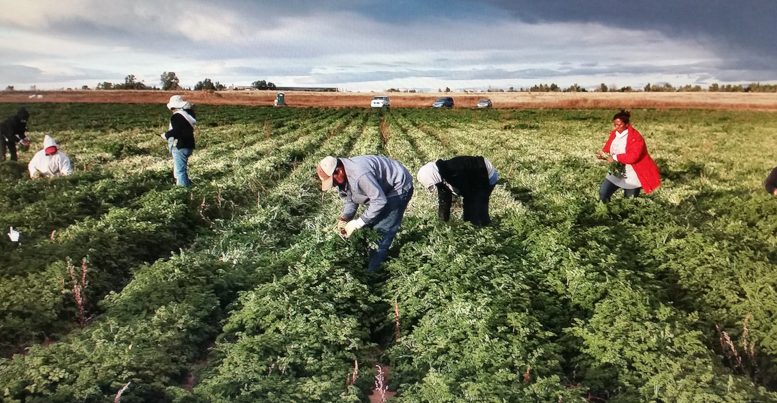By JAN LARSON McLAUGHLIN
BG Independent News
La Conexion has received a grant to help a group of essential workers forgotten during the pandemic.
The grassroots organization working with Latinx and recent immigrants, has been awarded a $45,000 grant to provide relief funds and emergency assistance to agricultural workers in the Northwest Ohio region.
“These essential workers have received no relief whatsoever,” said Beatriz Maya, director of La Conexion.
Many agricultural workers are vulnerable to the virus because they have no health insurance and live in crowded conditions.
“So they are more at risk than other people,” Maya said.
Almost 80% of ag workers in the U.S. are foreign born, and more than half of those are estimated to be undocumented, according to La Conexion. These workers had no access to the pandemic relief funds provided by the government. Even “mixed status” families had been excluded from the relief funds.
“We want fruits and vegetables in this country,” Maya said. “Why do we tolerate this exploitation?”

Through these funds, La Conexion will be able to assist 162 farmworker families in this region with $200 Visa gift cards. The cards were obtained at a reduced price thanks to a collaboration with Glass City Federal Credit Union in Bowling Green. In addition to the cash funds, emergency protection articles, such as face masks, hand sanitizer, disinfectant, and toilet paper will also be distributed among agricultural worker families in the region.
La Conexion will start by visiting migrant farm camps in the region.
“For some workers, it’s late in the season. We know where the camps are located,” Maya said. “We are very excited about this. It’s a big responsibility.”
Then La Conexion will reach out to year-round agricultural workers. Many of those jobs are also filled with undocumented workers, she said.
“Domestic workers don’t want to do that work anymore,” Maya said of labor-intensive farm work. “They haven’t wanted to do that for decades.”
While their work is vital to getting crops from the fields to grocery stores, there is still no process for those undocumented workers to change their status in the U.S.
“There is no path to legal residency,” she said. “Why do we as citizens in this country tolerate this situation?”
Agriculture is the number one industry in Ohio, contributing $53 billion to the Ohio economy. However, the estimated 33,000 Ohio farmworkers remain among the state’s lowest paid, and many work and live in substandard conditions. These essential workers pick and pack fruits and vegetables, work in dairy farms, nurseries, and packing sheds, while in some cases lacking basic rights and protections, according to La Conexion.
“La Conexion has been advocating for pandemic relief funds and adequate health and safety protections for Latinx and immigrant workers since the pandemic began,” Maya said. “We have written letters to the Ohio governor and federal and local elected officials regarding disparities.”
While state or federal funding to benefit immigrant essential workers are still denied, the funding obtained by La Conexion was awarded through a collaboration with Justice for Migrant Women and Hispanics in Philanthropy.





